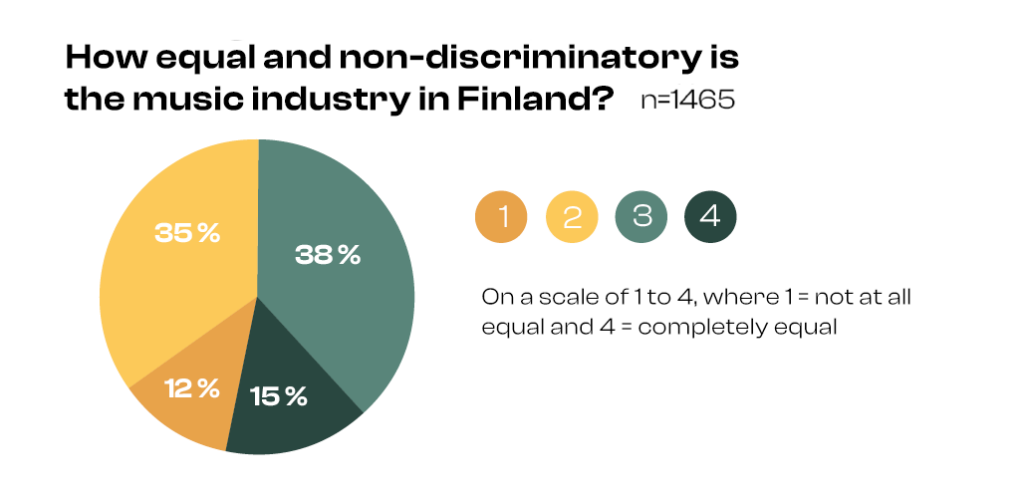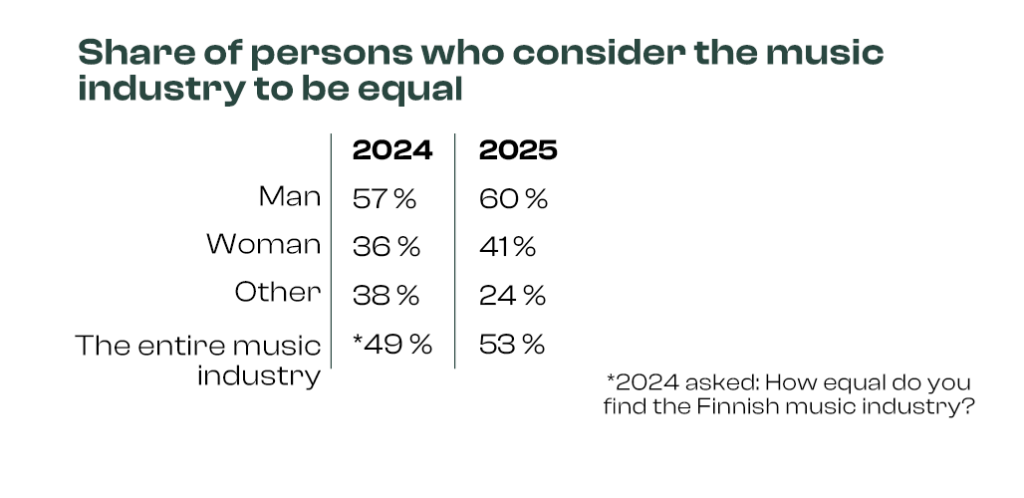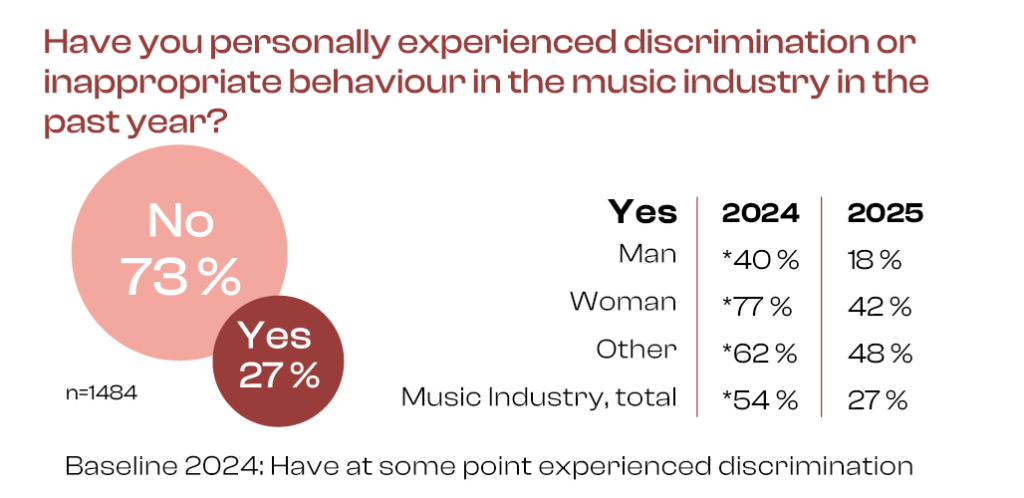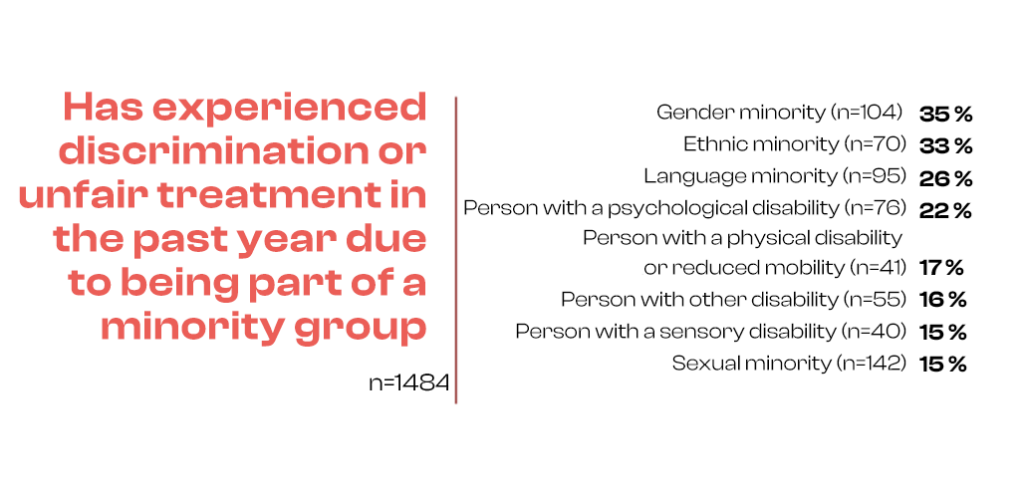Music industry survey: equality in the industry is gradually improving
9.4.2025
The recent equality barometer for the music industry shows that equality is gradually improving in the industry. However, inequality, inappropriate treatment and discrimination remain significant problems.
The barometer, jointly conducted by eleven music industry organisations, received responses broadly from the music industry. 53 per cent of the respondents feel that the industry is equal. In last year’s corresponding survey, the figure was 49 per cent.
However, the experience of equality varies greatly depending on gender, position and age. 41 per cent of women consider the industry to be equal, while 60 per cent of men agree with this statement. Of the respondents, 43% feel that everyone has equal opportunities to succeed in the industry.
Promoting equality for those working in the music industry is important, which is also reflected in the open-ended responses. As many as 93% of the respondents say that equality is an important value for them. More than four-fifths of those in the industry would like active measures to be taken to develop equality and non-discrimination.
”It’s great to see that the music industry has developed in the right direction, and many have noticed it. The survey also gave strong support to the view that public debate and practical measures to promote equality and non-discrimination must continue. We need to do our utmost so that the industry can truly develop and open up to everyone, regardless of background. In a small country like Finland, this is a prerequisite for future survival,” says Vappu Aura, Director of Communications, Marketing and Public Relations at Teosto.
78 per cent of the barometer respondents believe that the work culture in the industry accepts diversity, and 68 per cent feel that other people are respected in the industry.


Women and members of minorities experience the most discrimination
Despite positive developments, discrimination and inappropriate treatment are still commonplace in the music industry. Nearly one-third of all people working in the music industry have experienced discrimination and inappropriate behaviour in the past year.
There are also major differences in experiences of discrimination between genders. During the past year, 42 per cent of women and 18 per cent of men have experienced discrimination or inappropriate treatment.
On the other hand, 35 per cent of women and only four per cent of men have experienced discrimination or inappropriate treatment due to gender, i.e. one in three women and one in twenty-five men.
About one in three individuals from gender or ethnic minorities have experienced discrimination or inappropriate treatment due to belonging to a minority group.
Entrepreneurs and freelancers experience more discrimination and inappropriate treatment in the music industry than others. Age-related discrimination is the most common among those aged from 25 to 34 (24%) who are in the early stages of their careers. 13 to 14 per cent of people aged 35 to 54 experience discrimination.
Discrimination or inappropriate treatment also has major impacts on the well-being of those in the music industry. More than two-thirds of respondents feel that discrimination or inappropriate treatment has had a negative impact on their career development. Almost as many people recognise negative effects on opportunities to find the right networks and partners as well as on creative work in music. Among young people, discrimination has also led many to consider a change in career.


Significant shortcomings in reporting practices
Inappropriate behaviour most often manifests itself as inappropriate comments or jokes (58 per cent), belittling of competence (56 per cent), lack of recognition or questioning of ideas and thoughts (54 per cent).
Only about one-third of those who have experienced discrimination or inappropriate treatment have reported it. The main reason for this was that there is no appropriate authority to report to. More than half also feel that reporting is pointless or fear that it would have negative consequences for themselves.
”Although awareness and guidelines have increased, it is still unclear to many who to report inappropriate behaviour to. The industry clearly needs new kinds of low-threshold channels so that cases can be addressed more effectively,” Aura emphasises.
Public debate drives change
According to the respondents, the biggest challenges in the music industry are income security and insecure short-term jobs, as well as the concentration of decision-making power on a few. Access to networks is also a significant challenge for many, and women and non-binary people, in particular, find it critical for their careers.
Women, young people and freelancers have more gloomy views on equality in the industry than others. The industry is still considered to be dominated by men, with ”old boy networks” acting as gatekeepers to the music industry, among other things.
According to the respondents, the most effective ways to improve equality are public debates (72 per cent), examples of brave people (60 per cent) and highlighting role models (41 per cent).
Many respondents are grateful for the increased debate and awareness within the industry and in the media. The development of guidelines is also seen as a positive step forward.
Training in the music industry also plays a key role in strengthening equality and non-discrimination. According to the survey, fewer than one in two music pedagogues and subject teachers in music feel that the themes of equality and non-discrimination are sufficiently addressed in teaching. Teachers act as role models and trendsetters for young people joining the industry, so the development of education plays a key role in building a more equal music industry.
Nearly 1,500 music industry respondents
The survey was conducted in March 2025, and a total of 1,484 people from the music industry responded to it. Many respondents worked in several roles in the music industry: 1,123 of them were performers or musicians, 821 composers or lyricists and 446 producers. The respondents also included representatives of publishers, record companies and organisations, as well as music teachers and students. The margin of error of the study is 95 percent with a reliability of +/- 2.7 per cent. The results of the study were compared with the results of the survey carried out in 2024.
The non-discrimination barometer for the music industry was conducted by Tutkimustoimisto Vastakaiku Oy and coordinated by Teosto. The barometer partners were Gramex, Music Finland, Music producers – IFPI Finland, Finnish Musicians’ Union, Finnish Jazz Federation, Conservatory Association of Finland, Finnish Music Creators’ Association, Finnish Music Publishers Association, Association of Finnish Symphony Orchestras and Society of Finnish Composers.
The full study report in English will be published later.
More information:
Vappu Aura/Teosto, Director of Communications, Marketing and Public Relations
puh. +358 50 560 4450, vappu.aura@teosto.fi